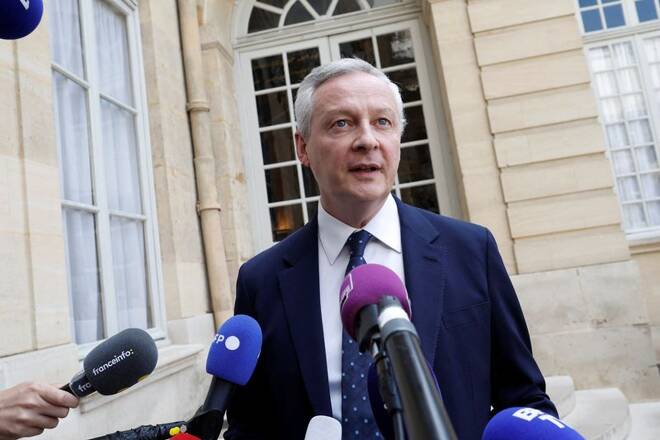Advertisement
Advertisement
France working on contingency plans as energy crisis looms
By:
PARIS (Reuters) - France is working on energy contingency plans because of cuts to gas flows from Russia which have hit the European market but it has not yet had to put them into action, Finance Minister Bruno Le Maire said on Monday.
By Dominique Vidalon and Leigh Thomas
PARIS (Reuters) -France is working on contingency plans for cuts to Russian gas flows as top bosses at energy companies urge individuals and businesses to reduce power use.
France is less reliant than some of its neighbours on gas imports from Russia, which account for about 17% of its gas consumption.
But concerns about supply from Russia come as France grapples with already limited electricity generation due to unexpected maintenance at its aging nuclear reactors, prompting concern over winter shortages.
European Union leaders last week agreed to boost preparations for further cuts in Russian gas, accusing Moscow of “weaponising” energy via a supply squeeze which Germany warned could partly shut its industry.
French Finance Minister Bruno Le Maire said on Monday the government was working on energy emergency plans but has not yet had to put them into action.
“We will determine which companies are of the most strategic importance, namely those for whom we can allow gas to be cut off and those for whom we cannot allow any cuts,” Le Maire told RMC Radio, without providing further detail.
“We are working on different scenarios, but for now this (rationing) is not the base case,” a finance ministry source said.
In April, gas transport network operator GRTgaz said it had put in place measures that can be invoked to limit gas supply to customers in the event of shortages, and called on suppliers to fill underground storage ahead of next winter.
So-called load shedding is the deliberate shutdown of consumption to help cover supply deficits, usually determined through contracts with industry in the event of excess demand.
French gas users whose consumption exceeds 5 gigawatt hours (GWh) per year would be the first group impacted by load-shedding, the company had said.
These notably include large industrial sites in the refining, chemical and glass sectors as well as commercial malls and stadiums.
Last week, France said it would aim to fill its gas storage facilities by early autumn from 59% full now and that it will install an offshore terminal to receive liquefied natural gas (LNG) at the northern port of Le Havre in September 2023.
It also called for a 10% reduction in energy consumption over two years.
Le Maire on Monday said he backed an unusual call by the heads of France’s top energy companies for individuals and businesses to limit power consumption immediately.
“We need to work collectively to reduce our consumption in order to regain room to manoeuvre,” the chief executives of Engie, EDF and TotalEnergies said in an open letter published by weekly newspaper Journal du Dimanche.
The letter signed by Engie’s Catherine MacGregor, EDF’s Jean-Bernard Levy and TotalEnergies’ Patrick Pouyanne cited sharp declines in Russian gas supply as well as limited electricity generation because of maintenance issues.
“The surge in energy prices that results from these difficulties threatens our social and political cohesion and weighs too heavily on the purchasing power of families. This is why we are launching this joint appeal” they wrote.
France on Sunday extended its mechanism for regulating gas prices to the end of the year. The regulated tariff regime was originally set to end at the end of June.
(Reporting by Tassilo Hummel; editing by Gareth Jones and Jason Neely)
About the Author
Reuterscontributor
Reuters, the news and media division of Thomson Reuters, is the world’s largest international multimedia news provider reaching more than one billion people every day. Reuters provides trusted business, financial, national, and international news to professionals via Thomson Reuters desktops, the world's media organizations, and directly to consumers at Reuters.com and via Reuters TV. Learn more about Thomson Reuters products:
Did you find this article useful?
Latest news and analysis
Advertisement
